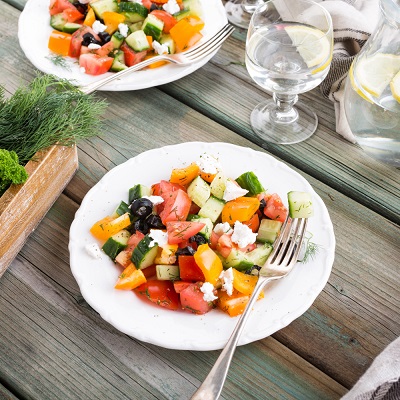 If you’re looking for a way to promote healthy aging, you don’t have to start out on an epic quest like Ponce de León. There is no fountain of youth, but there can be a mountain of health. You might be surprised at where this mountain is. Your refrigerator may hold the key to aging healthily, and all it takes are a few tweaks to ensure a great golden age.
If you’re looking for a way to promote healthy aging, you don’t have to start out on an epic quest like Ponce de León. There is no fountain of youth, but there can be a mountain of health. You might be surprised at where this mountain is. Your refrigerator may hold the key to aging healthily, and all it takes are a few tweaks to ensure a great golden age.
1 – Kick Out Inflammation
Some foods containing high fat and trans fats can cause inflammation in the body. According to Web M.D., inflammation can cause a whole host of age-related disease.
One of the most obvious effects of inflammation can be seen right on your face. Inflammation causes a breakdown of collagen in the skin and causes wrinkles. Kick out trans-fat, high salt foods to limit the inflammatory response in the body.
2 – Eat More Plants
The American Institute for Cancer Research suggests that aging adults focus on a more plant-based diet so that they get more antioxidants and phytochemicals in their diets.
Both of these elements have been shown to fight cancer, inflammation, and reduce the risks of heart disease and stroke. With a list of benefits like that, we should all focus on a plant based diet.
3 – Eat Less Meat
While it may not be possible for you to go completely meatless, you can choose to eat less meat. When you do choose meats, the American Institute for Cancer Research recommends that you choose meats high in omega-3 fatty acids and lean proteins.
Swapping regular beef for grass fed beef or venison and eating more cold-water fish will give you all the benefits of increased omega-3 fatty acids.
4 – Fewer Calories, More Nutrients
As you age, your calorie needs decrease while your nutritional needs increase. This means you need to start focusing on nutritionally dense foods that are low in calories like fruits and vegetables.
The European Partnership for Improving Health, Equity and Wellbeing discusses the importance of finding good nutritionally dense foods that also fit into the fixed budgets many people face as they age. Making small changes and swapping a processed snack for a fresh snack can make the adjustment a little easier.
5 – Moderate Alcohol
Australia’s Government website on Aging recommends that aging populations moderate their alcohol consumption. Alcohol can affect everyone differently and can severely interact with many medications.
If you are on medications and plan to drink alcohol, you should discuss this with your physician. If you can safely consume alcohol without any risk of drug interaction, then you should do so with limits. Ask your doctor.
6 – Drink Water, Always
Staying hydrated is important at any age. Proper hydration allows your body to perform all of its vital functions. Many digestive processes rely on having a good hydration level. Signs of dehydration can include dizziness and confusion. Needless to say, drinking enough water is paramount to good health.
How does this change as you age? After age 50, The Summit Medical Group reports that the body’s response to dehydration is weaker. When you were 25 and spent a day in the garden, your body would respond with an extreme thirst to let you know you needed to replace the lost fluid. After age 50, this may not happen.
A simple tweak to make sure you don’t suffer the effects of dehydration is to drink water, even when you’re not thirsty. Keeping a glass of water with you to sip on when you are relaxing is a good way to remind yourself that you need to rehydrate, even if your body is no longer sending you the right signals.
There is no need for a drastic, over the top change in your life once you reach your silver or golden years. The truth is lifestyle diseases that stem from unhealthy diets account for more deaths in the US than any other cause of death, namely, heart disease, cancer, and stroke.
Small changes, however, can make a big difference in your quality of life. Enjoying your retirement will be much easier if you have a healthy body that is fueled by the right foods. What changes have you made since entering your golden years?






